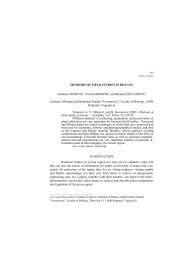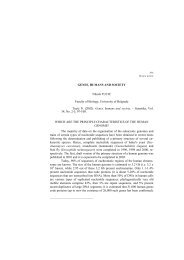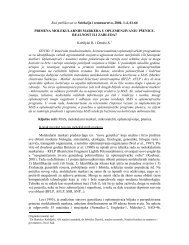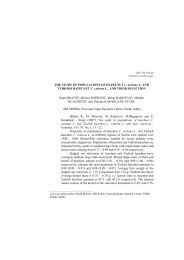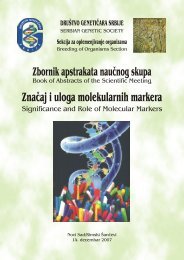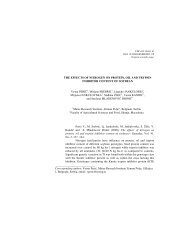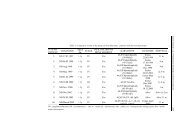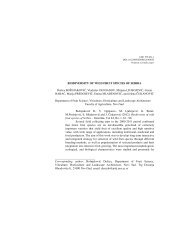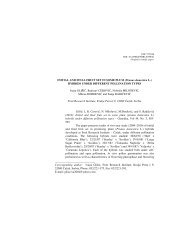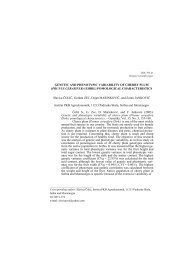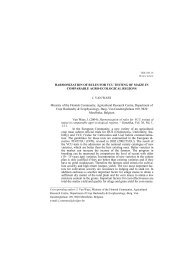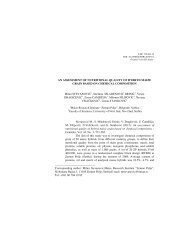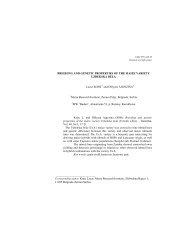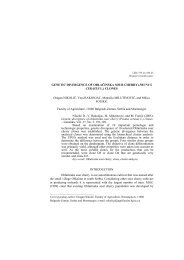Zbornik - Društvo genetičara Srbije
Zbornik - Društvo genetičara Srbije
Zbornik - Društvo genetičara Srbije
Create successful ePaper yourself
Turn your PDF publications into a flip-book with our unique Google optimized e-Paper software.
II-Uvo-2 ZBORNIK ABSTRAKATA III KONGRESA GENETIÈARA SRBIJE 45<br />
Subotica, 30. novembar - 4. decembar 2004.<br />
ANALIZA GENA ZA BIOSINTEZU SEKUNDARNIH METABOLITA<br />
KOD PRIPADNIKA RODA Streptomyces<br />
M. Saviæ, Ivana Bratiæ i Branka Vasiljeviæ<br />
Institut za molekularnu genetiku i genetièko inenjerstvo, Beograd<br />
Razlièiti mikroorganizmi proizvode sekundarne metabolite od kojih veæina pokazuje<br />
toksièno delovanje na razlièite æelije i organizme. Ovi metaboliti, ili prirodni proizvodi,<br />
predstavljaju izuzetno znaèajan resurs za otkrivanje novih jedinjenja sa specifiènim<br />
fiziološkim delovanjem. Poliketidi su velika i strukturno veoma razlièita grupa bioaktivnih<br />
jedinjenja za èiju biosintezu su odgovorne poliketid sintaze (PKS). Molekularna<br />
karakterizacija gena ukljuèenih u biosintezu poliketidnih metabolita je ukazala na postojanje<br />
kompleksnih enzimskih sistema èiji lokusi obièno zauzimaju desetine hiljada baznih parova<br />
na hromozomu. Kod tipa I PKS enzimatski domeni su organizovani u module i genetièki<br />
redosled modula je kolinearan sa redosledom biohemijskih reakcija. Svaki modul je<br />
odgovoran za prepoznavanje i ugraðivanje specifiènog malog konstituenta u rastuæi<br />
poliketidni lanac, kao i za prateæe reakcije redukcije. Ovakav mehanizam je u suprotnosti sa<br />
tipom II PKS gde se istovetni set proteina, svaki zasebno katalizujuæi razlièitu enzimatsku<br />
reakciju, koristi tokom nekoliko ciklusa. Analizirajuæi laboratorijsku kolekciju streptomiceta<br />
izabran je soj Streptomyces sp. MS405. Odabrani soj proizvodi bioaktivno jedinjenje<br />
mehanizma delovanja nalik na imunosupresor FK506. Poreðenjem sa poznatim poliketidnim<br />
jedinjenjima, metodom tankoslojne hromatografije, kao što su FK506, FK520, rapamicin,<br />
eritromicin i rifampicin, utvrðeno je da se analizirano jedinjenje razlikuje od referentnih.<br />
Kloniranjem kratkog DNK fragmenta utvrðeno je da biosinteza ovog jedinjenja zavisi od<br />
PKS tipa I. Filogenetske analize ukazuju na visok stepen homologije izmeðu kloniranog<br />
fragmenta i fkbA PKS S. hygroscopicus, prozvoðaèa imunosupresora rapamicina.<br />
ANALYSIS OF THE GENE CLUSTERS INVOLVED IN BIOSYNTHESIS<br />
OF THE SECONDARY METABOLITES AMONG MEMBERS OF THE GENUS<br />
Streptomyces<br />
A variety of microorganisms produce secondary metabolites, many of which exhibit<br />
toxic activity against different cells and organisms. These metabolites have proved to be<br />
a valuable resource to identify compounds with specific biological effects. Polyketides<br />
are a large and structurally diverse family of bioactive compounds whose biosynthesis is<br />
catalysed by polyketide synthases (PKS). Molecular characterization of the genes involved<br />
in formation of polyketide metabolites has demonstrated the involvement of complex<br />
enzyme systems whose genetic loci usually span tens of thousands of base pairs on a<br />
chromosome. In type I PKS enzymatic domains are organized into modules and genetic<br />
order of the modules is collinear with the order of biochemical reactions. Each module is<br />
responsible for recognition and incorporation of a specific small constituent into growing<br />
polyketide chain as well as the subsequent reductive reactions. This is in contrast to type<br />
II PKS where a set of discrete proteins, each catalyzing different enzymatic reaction, is<br />
repeatedly employed. Analysing laboratory streptomycetes collection strain Streptomyces<br />
sp. MS405 was selected. This strain produces bioactive compound with the same<br />
mechanism of action as immunosuppressant FK506. Thin layer chromatography (TLC)<br />
studies showed that the compound is chemically different compared to referent<br />
polyketides: FK506, FK520, rapamycin, erythromycin and rifampycin. Cloned short<br />
fragment of the biosynthetical gene cluster revealed that biosynthesis of this compound is<br />
governed by type I PKS. Phylogenetical studies imply high sequence homology between<br />
cloned sequence and fkbA PKS of S. hygroscopicus, producer of polyketide immunosuppressant<br />
rapamycin.



